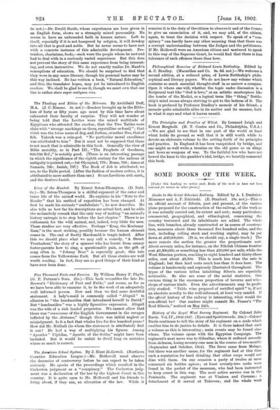The Theology and Ethics of the Hebrews. By Archibald Duff,
MA. (J. C. Nimmo. 5s. net.)—Readers brought up in the Bible- lore of forty or fifty years ago must by this time have about exhausted their faculty of surprise. They will not wonder at being told that the Levites were the mixed multitude of Egyptians who attended the exodus; that the Two Tables were slabs with " strange markings on them, crystalline or fossil "; that Caleb was the totem name of dog, and Joshua, or rather Nun, that of fish. Yahveh was a rain-god. "No particular moral excellence was attributed to him." But it must not be supposed that there is not much that is admirable in this book. Generally the view of Bible morality, as in Part III., "The Prophets of Goodness, 300-700 B.C.," is notably good. (There is an interesting passage in which the significance of the eighth century for the nations of antiquity is pointed out,—lst Olympiad, 776; Rome, 768; Amos at Samaria, 760; Isaiah, 737.) The Book of Job is attributed, we see, to the Exile period. (After the fashion of modern critics, it is attributed to more authors than one.) So are Leviticus xvii.-xxvi., and the deutero-Isaiah.










































 Previous page
Previous page